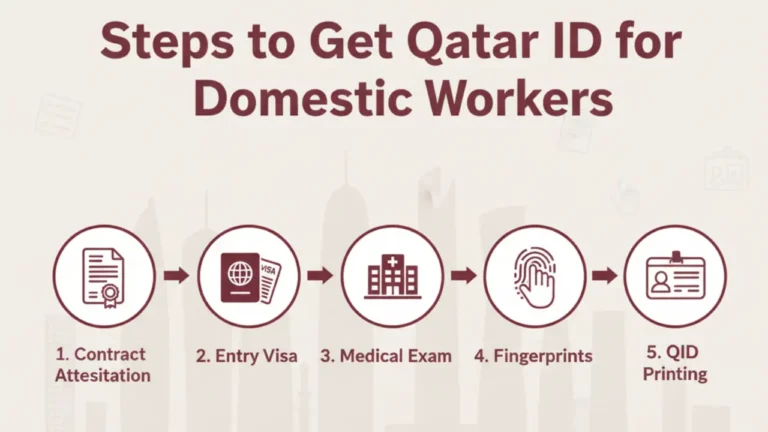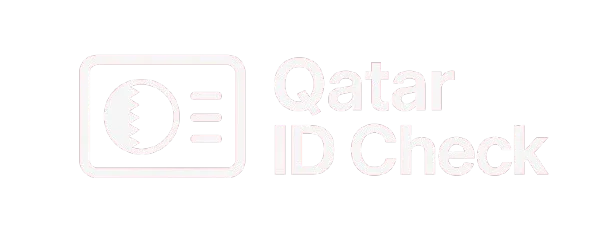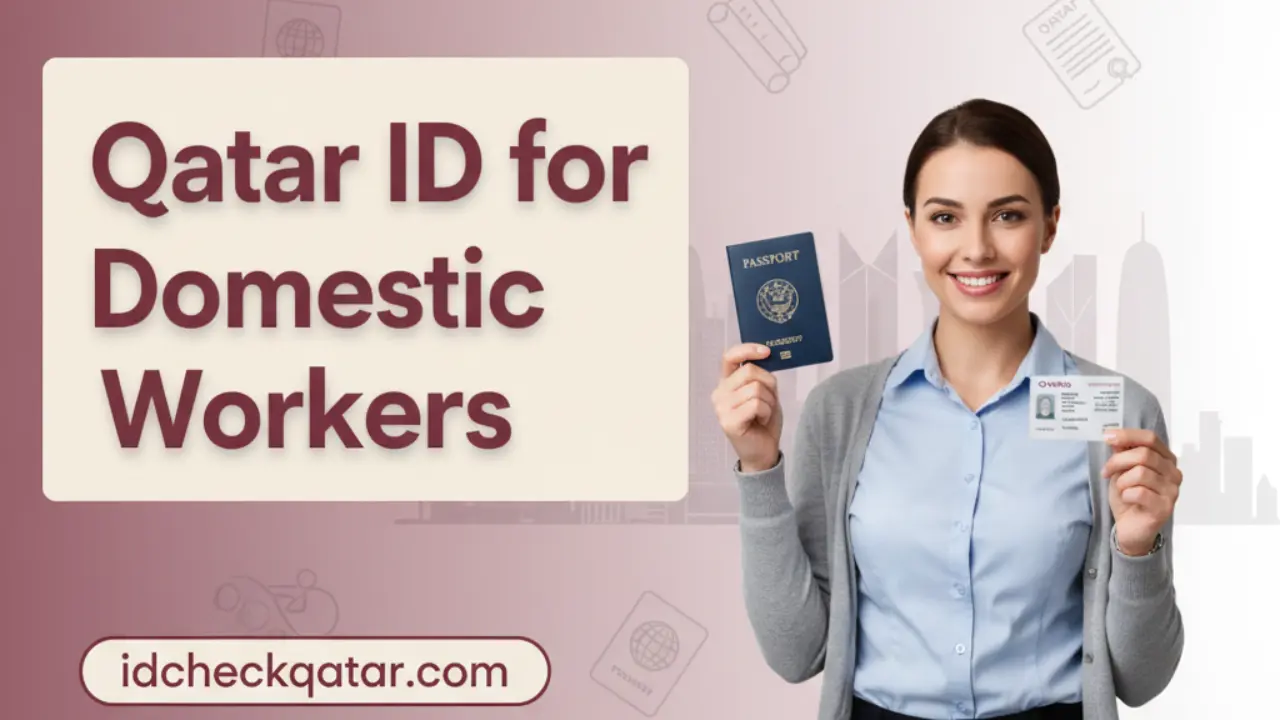Qatar ID for Domestic Workers | 2026 Complete Guide
Qatar ID for Domestic Workers is the official ID card issued after the residence permit is approved, confirming that a housemaid, nanny, driver, or cleaner is legally sponsored in Qatar. It follows contract attestation, medical testing, and fingerprinting before printing the QID.
Domestic workers keep many households running in Qatar, and the process to obtain the Qatar ID is simple if you follow each step in order. This guide explains the contract, the necessary documents, the medical and biometric requirements, and how sponsors can renew the card on time. If you need to check whether a card is active or not, you can verify the QID status using your main Qatar ID Check guide for the latest online methods and quick lookups. Use it whenever you want instant confirmation: check your Qatar ID status.
What is the Qatar ID for Domestic Workers?
It is the national identification card that proves a domestic worker’s legal residence and sponsorship in Qatar.
Qatar ID for Domestic Workers is the physical and digital proof that the worker is legally allowed to live and work in Qatar under a private sponsor. The card is issued after the residence permit is approved. It enables access to essential services, such as healthcare, banking, and government portals. For domestic workers, the Qatar ID also serves as primary identification for travel processes at airports and local checkpoints.
Who Qualifies for a Domestic Worker QID?
Domestic workers like housemaids, nannies, drivers, and cleaners qualify when properly sponsored and contracted.
Household employers can sponsor domestic workers for roles such as housemaids, nannies, private drivers, cooks, and cleaners. A written, attested contract is required, and the terms should clearly state job duties, salary, and allowances. Sponsors should ensure the worker’s passport is valid, that the visa category matches household work, and that the worker meets any medical and age requirements that apply.
Minimum Salary and Allowances
Domestic workers must receive at least the minimum wage and additional allowances if food or housing is not provided.
Sponsors should offer fair compensation that meets the national wage floor. If the sponsor provides accommodation and food, the salary can reflect this. If not, the sponsor must add housing and food allowances to the monthly pay. The safest approach is to include the base wage, any allowances, and payment frequency inside the signed and attested contract. Clear payroll records protect both parties and prevent disputes later.
Employer checklist for pay:
- State the base salary and any allowances in the contract.
- Pay on time each month and keep signed receipts.
- Adjust if roles or the scope of work change with mutual consent.
- Store payroll records with contract copies for the full sponsorship period.
Exit and Travel Rules for Domestic Workers
Most domestic workers can travel after giving proper notice to the sponsor.
Domestic workers can generally leave Qatar after giving advance notice to the sponsor. The common practice is to inform the employer before booking travel, then carry the passport, Qatar ID, and any return documents while exiting. Always check airline rules and destination visa needs before the trip. For longer trips, make sure the worker’s residence permit and Qatar ID remain valid to avoid re-entry problems.
Step-by-Step: How to Obtain Qatar ID for Domestic Workers
Sponsors secure the QID by authenticating the contract, obtaining the entry visa, completing medicals, registering fingerprints, and then printing the card.
This step-by-step sequence keeps the process smooth and avoids repeat visits.
1. Draft and attest the domestic worker contract
Write the employment contract in Arabic and ensure all terms are clear. Use the official contract attestation channel to authenticate it before proceeding.
2. Apply for the entry visa under the household worker category
Submit the application with the worker’s passport details. Check if any pre-arrival documents are required, such as a good conduct certificate or pre-travel medical.
3. Complete medical examination on arrival
Once the worker arrives, book the medical exam quickly. Medical results are required to move forward with the residence permit and Qatar ID for Domestic Workers.
4. Register fingerprints and biometrics
After medical clearance, the worker must complete fingerprinting. Bringing the right documents reduces waiting time and avoids a second visit. For a simple walkthrough of documents and counters, see your guide on fingerprint steps in Qatar.
5. Residence permit approval and QID printing
When the medical and biometrics are complete, the residence permit is issued. After that, the QID can be printed, and the domestic worker can start using it for services and travel.

Documents Checklist for Qatar ID for Domestic Workers
Sponsors should prepare passport copies, the attested contract, medical results, and fingerprint confirmation to finalize the QID.
Before each step, confirm that you have originals and clear copies. This simple table helps you prepare:
| Document | Provided By | Why It Matters |
|---|---|---|
| Worker passport (valid 6+ months) | Worker | Needed for visa, medical, and residence steps |
| Attested domestic worker contract | Sponsor | Confirms legal terms and sponsor obligations |
| Entry visa approval | Sponsor | Grants permission to enter under household category |
| Medical exam result | Worker | Confirms fitness and enables residence approval |
| Fingerprint confirmation | Worker | Required for residence permit and QID issuance |
| Sponsor’s QID copy | Sponsor | Ties the worker to the correct sponsor record |
| Photos meeting ID specs | Worker | Needed for card printing and system records |
Tip: Keep a folder with these items plus payment receipts. It saves time at each office and helps if you need to reprint the Qatar ID for Domestic Workers later.
Validity, Renewal, and Fees
The Qatar ID for Domestic Workers is usually issued for one year and must be renewed before it expires.
QID validity for domestic workers commonly follows a one-year cycle. Sponsors should renew early to avoid penalties or service blocks. The renewal process is simpler than the first-time issuance because the contract, fingerprints, and medical are already in the system. Keep an eye on the expiry date and set reminders 30 to 45 days in advance. If address, phone, or job details change, update records during renewal for smooth processing.
Helpful context: For a broad overview of the residence journey that complements this page, you can guide readers to your walkthrough on how to get a residence permit in Qatar. It explains the system flow most sponsors will recognize.
Rights and Protections for Domestic Workers
Domestic workers have contract-based rights such as rest days, paid leave, breaks, and end-of-service benefits.
Sponsors should plan weekly schedules that respect daily work hour limits and allow for rest and worship. Domestic workers are entitled to at least one paid weekly rest day. Paid annual leave accrues over the year and should be scheduled in agreement with the worker. End-of-service benefits apply when a contract ends, and they should be calculated based on continuous service. These rules create a stable working relationship and reduce the risk of disputes.
Practical Timeline: From Offer to Qatar ID
Expect a few weeks from arrival to QID printing if documents are ready and appointments are available.
Every case is unique, but this general timeline helps:
- Week 0: Contract prepared and attested.
- Week 1: Entry visa issued for the household worker category.
- Week 2: Worker arrives and completes medical exam.
- Week 2–3: Fingerprint and biometrics registration.
- Week 3–4: Residence permit approval and QID printing.
Actual timing depends on appointment slots and how fast results are posted. Sponsors who book medicals and fingerprints early tend to finish sooner.
Common Reasons for Delays and How to Avoid Them
Most delays come from missing attestation, incomplete medicals, or fingerprint issues.
Here are the problems that slow things down and how to fix them:
- Contract not attested: Always authenticate the contract before applying for visas or appointments.
- Medical result not ready: Book the examination quickly after arrival and follow up on result collection.
- Fingerprint form errors: Bring all required documents, photos, and forms to avoid a second visit.
- Visa category mismatch: Confirm the visa is under the correct household worker category before arrival.
For first-time sponsors, your article on how to get Qatar ID gives a good overview of the basic post-arrival steps. It helps align expectations for the Qatar ID for Domestic Workers
Sponsor Responsibilities and Good Practice
Renew on time, keep clear payroll records, and respect rest and leave rules to maintain compliance.
Sponsors should treat documentation and payroll as ongoing tasks. Renew before expiry and keep digital copies of receipts. If food or housing is not provided, pay the correct allowances with the salary. Plan rest days and leave in advance and record approvals in writing. Store everything with the contract and residence records. This disciplined approach prevents most complaints and keeps the working relationship healthy.
Where to Go for Each Step
Use official channels for contract attestation, medical exams, and fingerprints so your application moves fast.
You will likely visit three main touchpoints:
- Contract attestation platform: Authenticate the domestic worker contract before the visa step.
- Medical Commission: Complete medical examination right after arrival to unlock residence processing.
- CEID or MOI counters for fingerprints: Bring medical results and required forms to finish biometrics.
For readers who need in-person help or directions, your guide to service centers is a great reference: find MOI counters and contacts.
Quick Tips to Reduce Rejections
Double-check every form, carry spare photos, and keep photocopies of all documents.
- Bring original passports and two photocopies for both sponsor and worker.
- Keep extra passport photos that match ID size requirements.
- Save every payment receipt and result printout.
- Use the same spelling across all records to avoid mismatches.
- Start renewals early to avoid late fees or service interruptions.
FAQs – Qatar ID for Domestic Workers
Conclusion
Getting a Qatar ID for Domestic Workers is a clear process when the right steps are followed, from contract attestation to medicals, fingerprints, and residence approval. For sponsors, this card is not only a legal requirement but also the key to giving their household staff access to healthcare, banking, and official services. By preparing documents in advance, renewing on time, and respecting the rights of domestic workers, both sponsors and employees can ensure a smooth, secure, and lawful experience in Qatar. For more detailed information, visit Qatar Ministry of Interior official portal.

